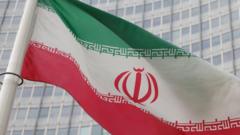The International Atomic Energy Agency's (IAEA) recent evaluation reveals Iran's first violation of nuclear non-proliferation obligations in two decades, intensifying regional tensions and complicating nuclear negotiations with the US.
Iran's Nuclear Compliance Comes Under Scrutiny by Global Watchdog

Iran's Nuclear Compliance Comes Under Scrutiny by Global Watchdog
International Atomic Energy Agency's latest findings raise alarms over Iran's nuclear activities and cooperation.
The International Atomic Energy Agency (IAEA) has issued a concerning report indicating that Iran has failed to fulfill its non-proliferation commitments for the first time in 20 years. This revelation stems from a resolution passed by the IAEA's board of governors, which carries the potential for a referral to the United Nations Security Council if corrective actions are not taken.
The report, published last week, outlined Iran's lack of cooperation with the agency and raised serious concerns about undisclosed nuclear materials and covert activities in locations that have been previously scrutinized. In light of this development, Iran's foreign minister cautioned European nations against supporting the resolution, asserting that such action would provoke a strong response from Tehran.
Moreover, this situation comes at a time when tensions in the Middle East are already heightened; recent advisories from the US government have prompted some American citizens to evacuate the region, fueled by reports of imminent Israeli military operations targeting Iranian nuclear facilities.
Iran maintains that its nuclear endeavors are strictly for peaceful purposes and rejects any intentions of developing or acquiring nuclear weapons. The backdrop of this situation lies in the 2015 nuclear deal with six major nations, wherein Iran had agreed to limit its nuclear program and allow the IAEA increased oversight in exchange for the easing of severe international sanctions.
However, following the withdrawal of the United States from the deal in 2018 under President Donald Trump—who criticized the agreement for not sufficiently curbing Iran's potential pathway to nuclear armament—the imposition of sanctions has led Iran to progressively violate the established restrictions. Notably, the latest IAEA report notes that Iran has amassed over 408 kilograms (900 pounds) of uranium enriched to 60% purity, dangerously close to weapons-grade levels, signifying enough material to construct approximately nine nuclear bombs.






















